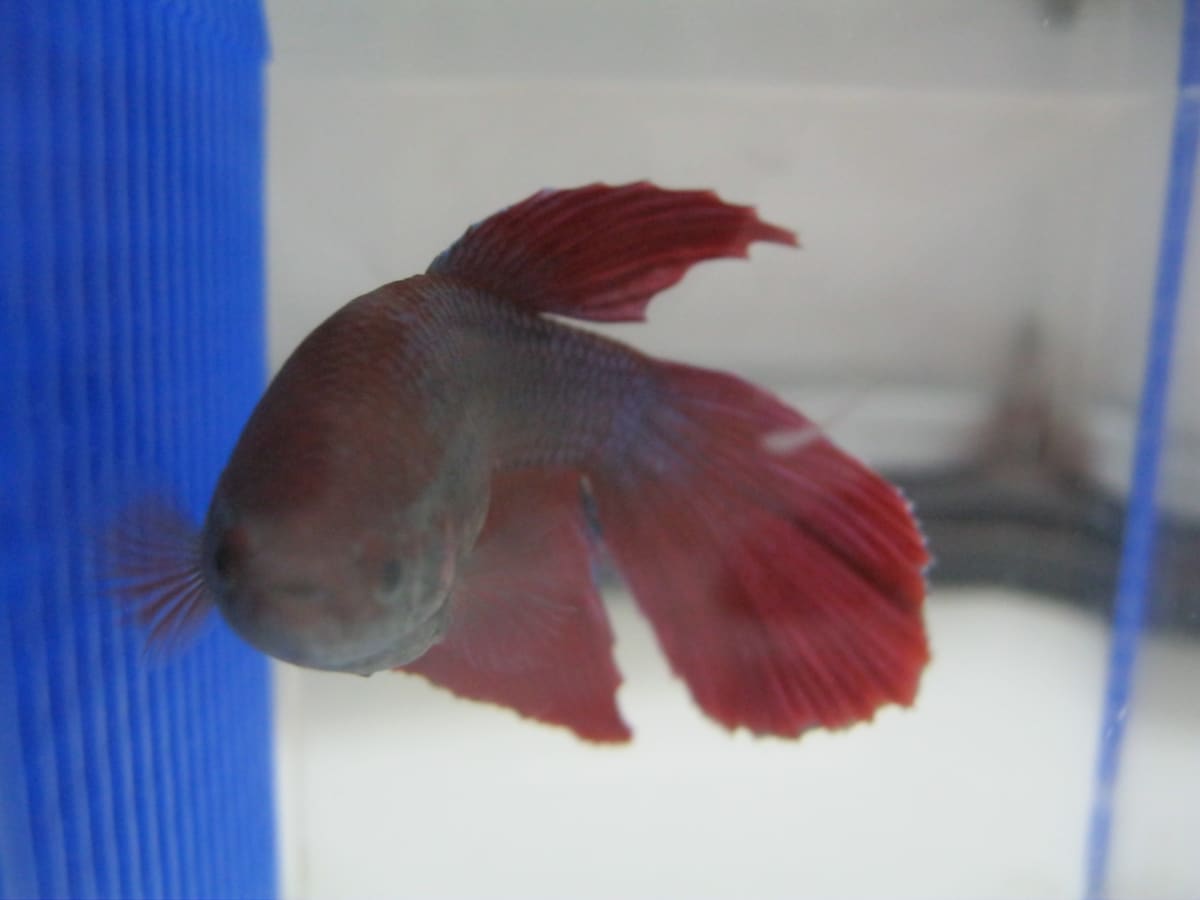Introduction:
Betta fish are beautiful and vibrant creatures that are a popular choice for aquarium enthusiasts. However, they are also prone to various health issues, including white fuzz on their bodies. This condition is often caused by a fungus, and if left untreated, it can be fatal for your betta fish.
Paragraph 1:
If you notice white fuzz on your betta fish, don’t panic. It’s a common issue that can be easily treated with the right approach. In this article, we will discuss the causes of white fuzz on betta fish and how to identify and treat it effectively.
Paragraph 2:
White fuzz on betta fish can be caused by a variety of factors, including poor water quality, stress, and overcrowding. It’s important to identify the underlying cause of the issue to prevent it from happening again in the future. With proper care and treatment, your betta fish can make a full recovery and return to its vibrant and healthy self.

Identifying and Treating White Fuzz on Betta Fish
Betta fish are one of the most popular aquarium fish. They are known for their vibrant colors and unique personality. However, like all fish, bettas are susceptible to various illnesses. One of the most common health issues that betta owners face is white fuzz on the fish. This article will discuss how to identify and treat white fuzz on betta fish.
What is White Fuzz on Betta Fish?
White fuzz on betta fish is a common fungal infection. It appears as a white, cotton-like substance on the skin and fins of the fish. This infection is caused by a fungus called Saprolegnia. It is a water mold that thrives in warm, stagnant water.
Identifying White Fuzz on Betta Fish
The first sign of white fuzz on betta fish is the presence of a white, cotton-like substance on the skin and fins of the fish. The fish may also exhibit other symptoms such as lethargy, loss of appetite, and clamped fins. It is important to identify and treat the infection as soon as possible to prevent it from spreading to other fish in the aquarium.
Treating White Fuzz on Betta Fish
The best way to treat white fuzz on betta fish is to create a clean and healthy environment for the fish. This can be achieved by performing regular water changes and maintaining proper filtration.
There are also various medications available to treat white fuzz on betta fish. These medications include antifungal medications such as Methylene Blue and Pimafix. It is important to follow the instructions on the medication carefully and to use the correct dosage.
Preventing White Fuzz on Betta Fish
Preventing white fuzz on betta fish is much easier than treating it. The best way to prevent white fuzz on betta fish is to maintain a clean and healthy environment for the fish.
Maintaining Water Quality
Maintaining water quality is crucial in preventing white fuzz on betta fish. It is important to perform regular water changes and to keep the aquarium clean. The water should also be tested regularly to ensure that the pH, ammonia, and nitrate levels are within the appropriate range.
Quarantine New Fish
When introducing new fish to the aquarium, it is important to quarantine them first. This will prevent any diseases they may be carrying from spreading to the other fish in the aquarium.
Avoid Overfeeding
Overfeeding can lead to an accumulation of waste in the aquarium, which can lead to poor water quality. It is important to feed the fish only what they need and to remove any uneaten food from the aquarium.
Benefits of Maintaining a Clean and Healthy Environment for Betta Fish
Maintaining a clean and healthy environment for betta fish has many benefits. It can prevent diseases such as white fuzz on betta fish and ensure that the fish live long and healthy lives.
Longer Lifespan
Betta fish that live in a clean and healthy environment tend to live longer than those that do not. This is because they are less susceptible to diseases and other health issues.
Increased Vibrancy
Betta fish that live in a clean and healthy environment tend to be more vibrant and colorful than those that do not. This is because they are less stressed and have a better quality of life.
White Fuzz on Betta Fish vs. Other Betta Fish Diseases
White fuzz on betta fish is just one of the many diseases that betta fish can contract. Here are some other common betta fish diseases and how to identify them.
Ich
Ich is a parasitic infection that appears as white spots on the fish’s body. The fish may also exhibit other symptoms such as lethargy and loss of appetite.
Fin Rot
Fin rot is a bacterial infection that causes the fins to rot away. The fins may appear frayed and the fish may exhibit other symptoms such as lethargy and loss of appetite.
Velvet
Velvet is a parasitic infection that appears as a gold or rust-colored dust on the fish’s body. The fish may also exhibit other symptoms such as lethargy and loss of appetite.
In conclusion, white fuzz on betta fish is a common fungal infection that can be easily treated and prevented. By maintaining a clean and healthy environment for the fish and being aware of the signs and symptoms of the infection, betta owners can ensure that their fish live long and healthy lives.
Frequently Asked Questions
Learn how to identify and treat white fuzz on betta fish with these commonly asked questions.
What is white fuzz on betta fish?
White fuzz on betta fish is a common sign of a fungal infection. It looks like a cottony substance that grows on the fish’s body and fins. It can be caused by poor water quality, a weakened immune system, or injuries to the fish’s skin. If left untreated, it can spread and cause serious health problems for your betta fish.
To prevent white fuzz from developing on your betta fish, make sure you maintain good water quality in their tank. Keep the water clean and at the right temperature, and avoid overcrowding the tank. You should also feed your betta fish a balanced diet and avoid overfeeding them, which can lead to excess waste and poor water quality.
How do I treat white fuzz on my betta fish?
If you notice white fuzz on your betta fish, you should start treatment right away. The first step is to remove the fish from the tank and place it in a separate container with clean, fresh water. You can then treat the fish with an anti-fungal medication, which you can purchase at a pet store or from your veterinarian.
Follow the instructions on the medication carefully and monitor your betta fish closely. You should also clean and disinfect the tank to prevent the fungus from spreading to other fish. Once the treatment is complete, you can gradually reintroduce your betta fish back into the tank.
Can I prevent white fuzz from developing on my betta fish?
Yes, you can prevent white fuzz from developing on your betta fish by maintaining good water quality in their tank. This means keeping the water clean and at the right temperature, and avoiding overcrowding the tank. You should also feed your betta fish a balanced diet and avoid overfeeding them, which can lead to excess waste and poor water quality.
It’s also important to monitor your betta fish regularly for any signs of illness or injury. If you notice any changes in their behavior or appearance, take action right away to prevent further health problems.
How long does it take to treat white fuzz on a betta fish?
The length of time it takes to treat white fuzz on a betta fish can vary depending on the severity of the infection and the treatment method used. In general, it can take anywhere from a few days to a couple of weeks to fully treat the infection.
During this time, it’s important to monitor your betta fish closely and follow the treatment instructions carefully. You should also continue to maintain good water quality in their tank and take steps to prevent the fungus from spreading to other fish.
Can white fuzz on a betta fish be fatal?
If left untreated, white fuzz on a betta fish can be fatal. The fungus can spread and cause serious health problems for your fish, including organ damage and death. It’s important to take action as soon as you notice any signs of white fuzz on your betta fish, and to follow the treatment instructions carefully.
With prompt and proper treatment, however, most betta fish can recover from a fungal infection and lead healthy, happy lives. It’s important to monitor your betta fish regularly for any signs of illness or injury, and to take action right away to prevent further health problems.

How to Fight Fungus on Aquarium Fish
In conclusion, identifying and treating white fuzz on Betta fish is crucial for their well-being. It is important to monitor your fish’s behavior and appearance regularly to catch any issues early on. If you do notice any white fuzz on your Betta, it is best to act quickly and start treating it with the appropriate medication.
Remember to keep your Betta’s tank clean and well-maintained to prevent any future health problems. A clean and healthy environment will promote a healthy immune system, preventing the growth of harmful bacteria or fungi.
Overall, being a responsible Betta owner means being aware of your fish’s health and taking action when necessary. With proper care and attention, your Betta fish can live a long and healthy life.
